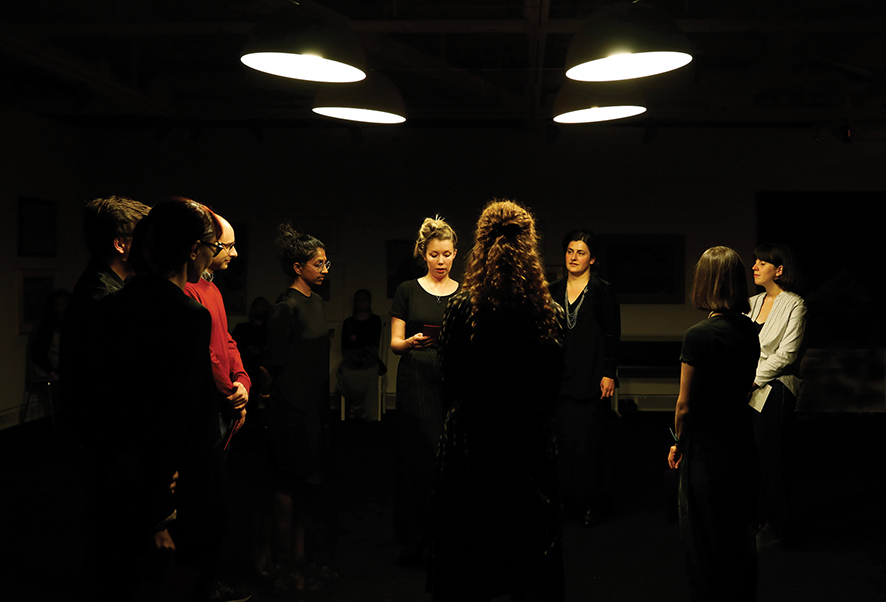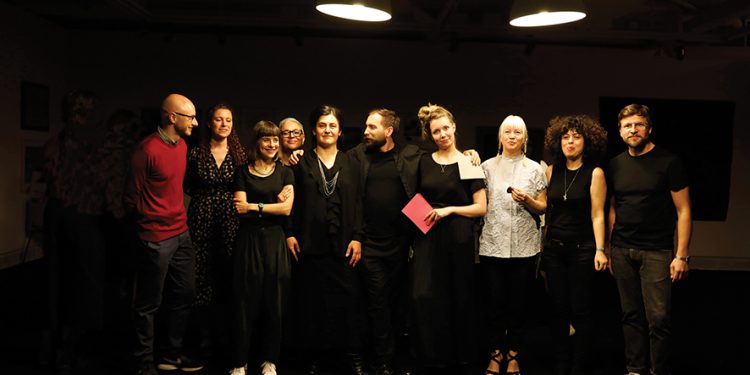Set against the backdrop of Germany’s show business and hit parades from the postwar era to today, “Ich nehm dir alles weg – Ein Schlagerballett” (I take it all away from you a Hit Ballet) explores the deeply entrenched issues of race, identity, and representation in a world obsessed with image and success. The play poignantly depicts symbolic celebrity figures, some immediately recognisable, some less so: their rise to fame and the compromises they were forced to make along the way, from battling racial stereotypes to confronting the tokenism that still pervades the German entertainment industry. Female and gender fluid characters’ struggles with authenticity versus marketability echo the experiences of reallife performers who have had to “play the game” in order to succeed, while questioning what it means to truly belong, and at what price belonging comes.
A striking parallel visualized prominently in the staging was derived from the double meaning of “Schlager” that stems from “schlagen” (hitting, beating up), likewise in English “hit” from hitting that brought in the metaphor of violence hidden or overt that is an inevitable negative side to publicity, celebrity culture and showbiz. Performers of color—immigrants, AfroGermans, and foreign entertainers—faced similar obstacles. Germany’s evolving relationship with race is unpacked with nuance, showing how the popular hit parades of the postwar era were both a window into mainstream culture and a battleground for racial acceptance.

The music, a combination of Schlager hits of various popularity degree, serves as a medium for exploring how racialized bodies have been packaged and sold in German entertainment. This blending of musical genres and languages challenges the sanitized version of multiculturalism often presented on screen. The juxtaposition of music styles asks the audience to confront the ways in which diversity is consumed, but not always embraced.
Director Joana Tischkau has crafted a tightly woven narrative that doesn’t shy away from the hard questions: Who gets to define success in show business? How does Germany’s past shape its present attitudes towards race in entertainment? And can true inclusivity ever be achieved in an industry built on commodification? The play laid bare the otherwise hidden injustices and racialization of showbiz that are topical issues. One can only wish that certain repetitive recitative sequences hadn‘t marred the overall impression. Joana Tischkau, together with Anta Helena Recke, Elisabeth Hampe and Frieder Blume, are founders of the German Museum for Black Entertainment and Black Music that houses a comprehensive archive of vinyl records, magazines, autographs and memorabilia. A digital tour of the museum immerses the visitor in a movement that brings together stars that undoubtedly influenced show business and the German pop industry.
Politics has lots to do with showbiz often with graver consequences, yet parallels are often more than obvious. Issues of identity, tokenism and justice from a female viewpoint are thus central for Sophia Tabatadze, a Georgian artist based in Berlin and Tbilisi. In her performance, developed at the CuratorLab at Konstfack University in Stockholm, she explored the life and work of Alexandra Kolontai, a Russian revolutionary, feminist, and prominent Marxist theorist who played a significant role in the early Soviet Union, particularly in advocating for women’s rights and social reforms. Alexandra Kolontai was staged by the official regime as a staunch Communist and powerful role model for emancipated new womanhood.
In her performance “Ask Alexandra,” the artist herself played the role of Kolontai, who was in fact nicknamed the “Valkyrie of the Revolution,” highlighting her strong involvement and influence within the revolutionary leadership before and right after the Russian Revolution of 1917. Yet, around 1923, Alexandra was removed from office and sent on various diplomatic missions.
In her performance, Tabatadze, a female artist herself, tried to study the powerplay within the totalitarian Soviet regime that, although it praised itself for gender equality, feministic emancipation and “equal pay for equal work, for all,” irrespective of gender or race, in reality implemented very few of the loud slogans of the state PR machine at the grass roots.

Tabatadze’s basic questions in this performance are: how much power did Kolontai still have after 1923, and to what extent did she use her intelligence, strength, and charms merely to secure her own survival? As Sophia wrote: “I had these questions and decided to directly ask Alexandra in a performance where I invited other members of the group from CuratorLab, which had concentrated on Alexandra Kolontai in that study year. Together, we formed a group in which I would appoint various roles to the participants, and ask them questions that they would answer in the style of the Family Constellation method.”
It is common knowledge that a diplomatic career was out of the question for women in the Soviet era. Only women who joined the Communist party could ever dream of any kind of professional success; strong personalities voicing critique were silenced by repressions and political persecutions. Poet Marina Zvetajewa and Georgian filmmaker Nutza Gogoberidze are just two examples.
For many women from the former East, Alexandra Kolontai is lost to oblivion. However, feminist ideas of emancipation and revolutionary change for equality and justice are as essential within capitalist societies today as they were back in 1917. How have priorities within the feminist movement evolved throughout the last 100 years? What relevance do role models like Alexandra Kolontai have for us today? How can we learn from past examples to make our societies fairer for all? Projects like these, with contemporary artists identifying with activists of the past, may not always give ready answers, but might help us to commemorate and carry on where the previous generations left off.
By Lily FürstenowKhositashvili














